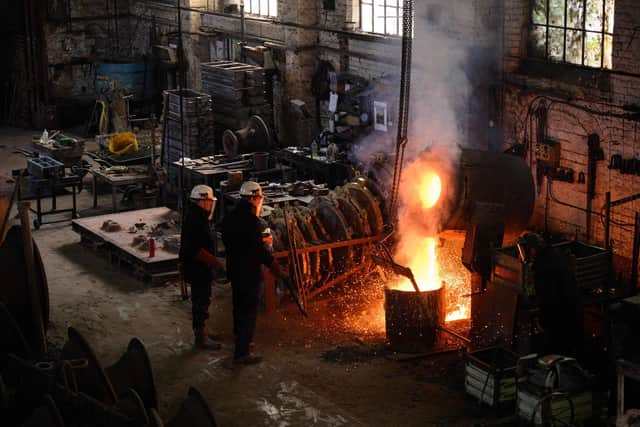Outlook for manufacturing deemed 'poor' as Brexit and cost-of-living issues stymie growth
According to an influential survey, the sector struggled to keep up its growth in May. Businesses blamed weaker growth in demand from within the UK, fewer export orders, troubled supply chains, rising costs, and the war in Ukraine.
As a result, the S&P Global/Chartered Institute of Procurement & Supply (Cips) UK manufacturing purchasing managers index (PMI) hit 54.6 in May, down from 55.8 in April. Anything above 50 means growth; anything below 50 signals shrinking.
Advertisement
Hide AdAdvertisement
Hide AdAlthough it notched up its 24th consecutive month of growth, the data shows a clear weakening for manufacturers. A significant part of this is the consumer goods industry, and for the first time in 15 months production actually fell.
The contraction is in part linked to the consumers that are the end target for those goods. Higher inflation means many are struggling to keep up old spending habits.
Rob Dobson, director at S&P Global Market Intelligence, said: "Household demand slumped in response to the ongoing cost-of-living crisis. With both input costs and selling prices rising at rates close to April's peaks, the surveys suggest that there is no sign of the inflationary surge abating any time soon.
"Manufacturers continue to report issues getting the right materials, at the right time, for the right price, and energy prices remain a major concern."


New export orders dipped for the eighth time in the last nine months, the survey participants revealed. Companies said that this was due to Brexit difficulties, delays in transport, shipping disruptions, and orders being cancelled due to the Ukraine war.
The cost that companies had to pay rose substantially in May, although dipped slightly from April when inflation was at near records. As a result they were forced to raise their own prices. Selling prices rose almost as fast as in April, a record high.
Mr Dobson also said: "Forward-looking indicators from the survey suggest that a further slowdown may be in the offing. Business optimism dipped to a 17-month low and weaker demand growth led to surplus production, meaning warehouse stock levels are rising.
"Any reversal of this stock-building trend could reinforce the drag of other headwinds and add to downside risks to the outlook."
Slowing
Advertisement
Hide AdAdvertisement
Hide AdMartin Beck, chief economic advisor to the EY Item Club, said: “A manufacturing PMI of 54.6 in May (unchanged from the earlier flash estimate) pointed to a sector still expanding. But the index was down from 55.8 a month earlier and the lowest since January 2021, which indicated a loss of momentum – as did the fact that output grew at the slowest rate for seven months.
“The survey’s new orders balance slowed a greater degree of softness than the headline index, also falling to a level not seen since January 2021, and its measure of business optimism fell to a 17-month low. Both bode poorly for the manufacturing sector and the PMI in coming months.
“And the headwinds confronting the sector point in the same direction. With the poor results for the consumer sub-sector, suggesting that the impact of the squeeze on household finances is beginning to make its mark, the outlook for the manufacturing sector is poor.”
Comments
Want to join the conversation? Please or to comment on this article.
